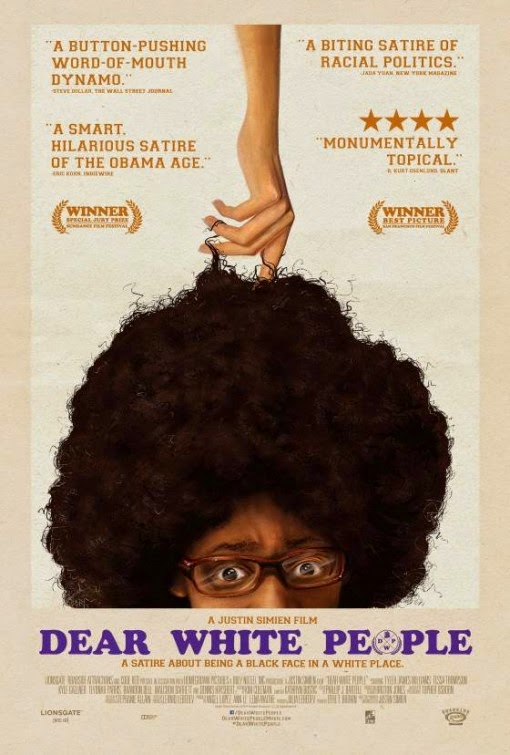Times Need to Change: "Dear White People" wittily confronts race
Dear White People (2014)
100 min., rated R.
Have we moved on from racism in the Obama Era? Is shoving "blackness" down people's throats preachy or freedom of speech? Is a "Big Momma's House 3" the best a black moviegoing audience deserves? Making it a hit at this year's Sundance Film Festival, writer-director Justin Simien intends to tell you what he thinks with his feature-debut brainchild, "Dear White People," a distilled cross-over between the works of Spike Lee, specifically 1988's "School Daze" and 1989's "Do the Right Thing," and anything by Whit Stillman. If 2013's "12 Years a Slave" shed horrifying light on the dark chapters of racism in early America, this satirical comedy sheds insight into today's culture where racism still lurks and does it with great wit and bite. Provocative, searing, and whip-smart in how it breaks down stereotypes, "Dear White People" still has a few hallmarks of a first-time effort, but when it takes aim, it is an enlightening reactionary piece fueled with acrimony and articulateness.
On the fictional Ivy League-like campus of the prestigious Winchester University, cynical biracial media-arts student Samantha White (Tessa Thompson) has started a race war. She hosts a radio show, "Dear White People," where she gives the white student body an education in black culture through a daily white-guilt memo. For instance, "Dear White People: The minimum requirement of black friends to not seem racist has just been raised to two. Sorry, but your weed man, Tyrone, does not count." Though the confrontational Sam leads a posse of radical black students, she secretly dates her film class T.A., Gabe (Justin Dobies), who happens to be white. She used to date poli-sci major Troy Fairbanks (Brand P Bell), the preppy son of Dean Fairbanks (Dennis Haysbert) who's now dating a white girl, Sofia (Brittany Curran), coincidentally the daughter of Winchester's president. Both Sam and Troy are competing for election in the head of Armstrong Parker House.
Meanwhile, there is Colandrea Conners (Teyonah Parris), who shortened her name to 'Coco.' She was raised in the hood, but aspires to be a reality-show star and socialite by straightening her hair, wearing "Real Housewives…" dresses and fraternizing with the rich, white campus house, led by the president's vaguely racist and homophobic son, Kurt (Kyle Gallner). To increase her views on her video-blog, Coco starts an online war with Sam, confessing how incensed she is that a white girl would ask if her hair is "weaved" and labeling Sam as a "Lisa Bonet wannabe." The unlikely hero of "Dear White People," though, is Lionel Higgins (Tyler James Williams), a bespectacled black sophomore who gets locked out of his dorm hall and goes through a series of halls, one being all-white, like a lost puppy looking for a home. He aspires to be a journalist by signing on to the campus newspaper staff and writing a piece on Sam's shenanigans. He is also gay, but seems the most confident with his racial and sexual identity out of anyone, rocking a touchable Afro.
Tessa Thompson (2010's "For Colored Girls"), Tyler James Williams (TV's "Everybody Hates Chris"), Brandon P Bell (TV's "Hollywood Heights"), and Teyonah Parris (TV's "Mad Men") all have equal room to each be considered a lead, and they all make the arch, didactic, if ever so sharp dialogue work. As Sam White (get it?), Thompson ferociously commands the screen as she carries herself with poise and agency. Sam might be a fearless non-shrinking violet who stands up for what she believes should be heard and shows confidence in her own identity, but she also has a vulnerable, human side in developments about her sick white father and her romance with a white man. As the shyly sweet Lionel, Williams is the unassuming emotional center as Lionel and his facial reactions never not earn a laugh. Parris is truly captivating, not only from being incredibly gorgeous, but in the way she fleshes out a character who is really insecure and full of contradictions.
Writer-director Justin Simien's feature debut often feels like a first film, with a precious overload of chapter headings; a faint, jazzy score that can always be heard in the background and might as well be elevator Muzak; and often flat framing (it becomes a distraction when so many actors are shot from the side) and an awful lot of whip pans ("Whiplash" did this with more motivation). All of that aside, Simien sorts through all of these characters quite well, and he has a lot to say and captures most of his commentary in forward-thinking, clear-eyed observations. There is also a startling power to what goes down at the "Pastiche" party, where white students appallingly dress up in blackface, namely when Lionel first shows up. Even more appalling, there is a collage over the end credits that shows stills of real-life "blackface parties" being held at universities over the last few years. Its confrontational pointedness has a tendency of being a self-congratulatory protest anthem, but "Dear White People" is a true conversation starter that has no fear discussing race in an uncomfortable but constructive way.
Grade: B












Comments
Post a Comment